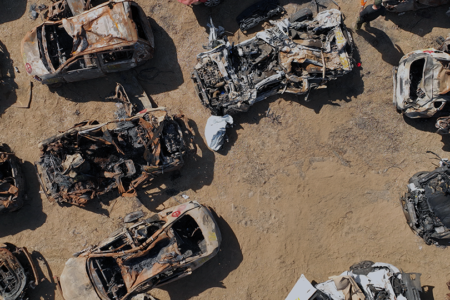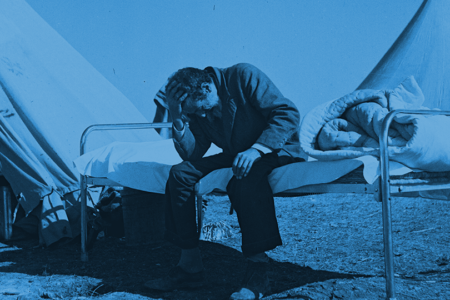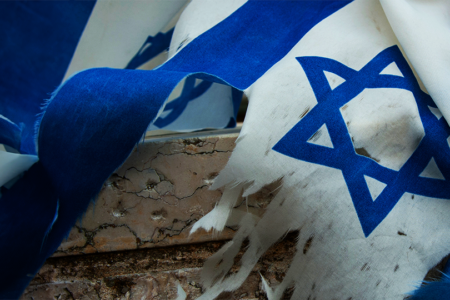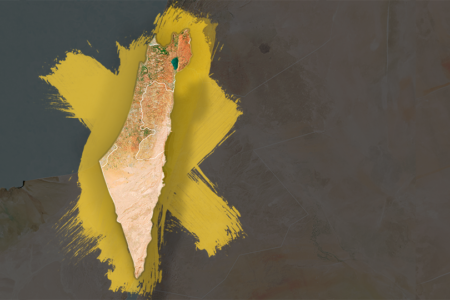The Life, Times And Message Of Isaiah The Prophet Jun/Jul 1974
Jehovah, The Avenger And Redeemer
ISAIAH CHAPTER 63
1 Who is this, that comes from Edom,
In crimsoned garments from Bozrah, resplendent in his attire,
Swaying in his great strength?
It is I who speak in righteousness, the mighty to save.
2 Why is Thine apparel so red?
And Thy garment like his who treads the winepress?
3 I have trodden the press by Myself,
And of the peoples there was none with Me.
I trod them in My wrath, and trampled them in My fury.
Their life sap spurted on My garments,
And all My apparel was stained.
4 For a day of vengeance was in My heart,
And My year of redemption has come.
And I looked and there was none to help,
And I was amazed that there was none to uphold;
Therefore, My own arm brought Me salvation,
And My fury, it upheld Me.
6 And I trod down the peoples in My wrath,
And made them drunk with My fury.
And I caused their lifeblood to flow down to the earth.
7 I will mention the loving acts of the LORD,
The praises of the LORD according to all that
Which the LORD has done for us,
According to all that which the LORD has bestowed on us,
And all the great goodness toward the house of Israel,
Which He has bestowed on them,
According to His compassion and His great kindness.
8 And He said: Surely they are My people,
Children who will not deal falsely,
So He was their Savior.
9 In all their afflictions He was afflicted,
And the angel of His face saved them.
In His love and His pity He redeemed them,
And He took them up and carried them all the days of old.
10 But they rebelled and grieved His holy spirit,
So He turned against them and became their enemy,
And He waged war against them.
11 Then His people remembered the days of old, of Moses:
‘Where is He who brought them up from the sea,
With the Shepherds of His flock,
Where is He who put within their midst His holy spirit?’
12 Who caused His glorious arm to. walk at the right hand of Moses
Who split the waters before them,
To make Himself an everlasting name?
13 Who led them through the abyss,
Like a horse in the wilderness,
Without stumbling?
14 As the cattle go down into the valley,
The Spirit of the LORD caused them to rest,
Thus didst Thou lead Thy people,
To make for Thyself a glorious name.
15 Look down. from heaven and see
From Thy holy and glorious habitation,
Where is Thy zeal and Thy mighty acts,
The yearning of Thy innermost heart and Thy compassion,
Are they now withheld from us?
16 For Thou art our Father,
Though Abraham does not know us,
And Israel does not acknowledge us,
Thou, O Jehovah, art our Father,
Our Redeemer, is Thy name from everlasting.
17 Why, O LORD, dost Thou cause us to err from Thy ways,
And hardenest our hearts from Thy fear?
Return, for the sake of Thy servants,
The tribes of Thine inheritance.
18 Thy holy people possessed (the land) but for a little while,
Our adversaries have trampled down Thy sanctuary.
19 We have become as they over whom Thou hast never ruled,
As they over whom Thy name has not been called.
Oh, that Thou wouldest rend the heavens and come down,
So that the mountains might quake before Thy presence.
Comment:
1-6 Jehovah, the avenger of His people.
The chapter presents an awesome vision of Jehovah. The prophet sees Him as a warrior marching from Edom in red bespattered clothing and asks anxiously:
1 Who is this, that comes from Edom in crimsoned garments from Bozrah?
Edom, although a brother nation, personifies the unrelenting hostility of the pagan world toward Israel (see Is. 34:5ff., Jer. 25:22f£., 49.17ff., etc.). In later rabbinical literature Edom became symbolic of Rome and all oppressive, pagan power,
Bozrah was once a great city in Edom, on the east shore of the Dead Sea. The name Edom, the other name of Esau (Gen. 36:8) comes from “adom”- “red”, suggesting blood. Bozrah is related to the word, “Bazir”—”a vintage”. It is interesting to note that during the Roman rule the coins of Bozrah had a winepress for their emblem.
Swaying in his great strength?
“Tsoch” is translated in the KJV as traveling or marching. The Hebrew term means “to sway” and is descriptive of a mighty man, as he marches. To the prophet’s anxious question, “Who is this?” comes the answer:
It is I who speak in righteousness, the mighty to save
The speaker introduces Himself as Jehovah, the perfectly righteous God who is mighty to save, that is, who is able to accomplish His righteous purpose.
2 Why is Thine apparel so red?
Literally, why is there red (adom) in Thy apparel. A clear allusion to Edom.
3-6 God answers the prophet’s question:
3 I have trodden the press by Myself
And of the peoples there was none with Me
The judgment which Jehovah executed over Edom, He accomplished, by Himself without any human assistance.
I trod them in My wrath and trampled them in My fury
Their life sap spurted on My garments and all My apparel was stained
Jehovah trampled a winepress, but the grapes were grapes of His wrath. Their life sap (nitscham) spurted and reddened His clothing. The extreme wrath of God is here described.
4 For a day of vengeance was in My heart and My year of redemption has come
In order that Israel might be redeemed, Edom the eternal enemy of Israel and of her God must first be obliterated. The vengeance of God is “for a day”, – a short period of time; but His redemption is “for a year”,—a long, or indefinite time.
5 And I looked and there was none to help
A virtual repetition of 59:6 (see comment) and 63:3a.
Therefore My own arm brought Me salvation . . . My fury . . . upheld Me
The divine arm and fury symbolize His power to perform redemptive acts. His fury refers to His holy nature which is outraged by the iniquity of men.
6 And I trod down the peoples in My wrath and made them drunk in My fury
These figurative expressions are descriptive of the staggering effect of Divine punishment, which make people reel like drunks. Some manuscripts read instead of “I made them drunk” rather “I broke them”, a change of one letter in the Hebrew text, a “b” instead of a “K”‘, (“Ashabreim” instead of “Ashakreim”‘).
And I caused their lifeblood to flow down to the earth
The prophet continues the comparison of the red grape juice from the winepress with the lifeblood (nitzcham), which flows down to the earth.
The political and physical end of the Edomite kingdom actually came during the Maccabean period, when the Edomites were compelled to become Jews. Later their land became a desert with few inhabitants.
63:7-64:12 A penitential confession, by the prophet on behalf of Israel and a prayer for forgiveness and their restoration to God’s favor
7-10 The prophet recalls Jehovah’s compassion for Israel in the days of old
7 I will mention the loving- acts of the LOBD
The word, “loving acts,” (chasdei) is in. the plural, indicating’ specific acts of God’s mercy and undeserved favor which Jehovah bestowed upon. Israel in the course of their history. This is the prophet’s act of thanksgiving and praise of the LORD.
8 And He said: Surely they are My people, children who will not deal falsely.
Having shown Israel so much loving kindness, Jehovah had the right to expect gratitude rather than treachery. On that assumption He became their Savior, rescuing them repeatedly from many perilous situations.
9 In all their afflictions He was afflicted and the angel of His face saved them
Here is one of the most disputed lines in Isaiah, resulting from the uncertain spelling of the short negative “lo”—”no” or “not”, which has a negative meaning; the same word “lo” with a long “o” has a positive sense and means “to him “.
In our verse “lo” is spelled in the negative way, but has an asterisk over the aleph, indicating that the negative sense should be ignored. In the KJV there is a marginal note; omit ‘not’.
There are fifteen such passages in the Hebrew Old Testament where the word “lo” was misspelled. It is written “no” (ketib), but should read (keri) in a positive sense. We have followed the obvious sense of text, which states that God does care and shares our afflictions. This is in stark contrast to the ancient Greek concept of God, as being completely indifferent to the affairs of men, a god who is “without passion or compassion.”
“The angel of His face” (or Presence)—malach panav. This angel personifies the presence of God with His people to save and protect them. He is the supreme manifestation of God. This angel is mentioned on a number of occasions (Ex. 14:19, 23:20-23, 32:12, 14, 15 etc.). In later rabbinical literature, “The Angle of His Face” became another name for the Messiah.
And He took them up and carried them all the days of old
As a father picks up his little child and carries it when it is weary and unable to walk by itself, so did Jehovah act with Israel.
10-14 Israel’s rebellion caused Jehovah to turn away from her
10 But they rebelled and grieved His holy spirit, so He turned against them . . .
Instead of being profoundly grateful to Jehovah who has done so much for them, they rebelled against Him and grieved His spirit (the Hebrew word “yitsvu” means to cause a cutting pain),—they cut Him to the quick. As a result, Jehovah turned against them and acted as if He were their enemy, even to the point of fighting against His people, yet with the ultimate purpose
of bringing them to their senses.1
11 Then His people remembered the days of old, of Moses.
This is one of the specially perplexing sentences in Isaiah. In Hebrew, it begins with the word—vaizkor—he remembered. The question arises to whom does “he” refer: to Jehovah or to Israel? It should also be noted that in the Hebrew text it reads: “Moses his people.” Some manuscripts amended the Hebrew text to read: “Moses, His servant” abdo” instead of “ammo). Our translation gives the most feasible sense. It means that the people having experienced
a period of great calamities finally woke up to the fact that all their misfortunes and miseries were the direct result of their disobedience and unfaithfulness. So Israel is asking the agonizing questions;
“Where is He who brought them up from the sea with the shepherds of His flock.”
This is a reference to the crossing of the Red Sea under the leadership of Moses and Aaron, a central event in the history of Israel.
“Where is He who put within their midst His holy spirit?”
The Holy Spirit rested on Moses and those whom Jehovah chose to lead His people.
12 Who caused His glorious arm to walls at the right hand of Moses
“The glorious arm of God” is the personified might of God in action, so that what Moses did was not in his own. strength, but through the enabling might of God.
Who split the waters … to make Himself an everlasting name
The crossing of the Sea brought Jehovah a name which would last forever.
13 Who led them through the abyss, like a horse in the wilderness without stumbling?
“The horse in the wilderness” is another figure of speech which expresses the personal care of God for His people, just like a man might lead his horse by the halter through a dangerous land in order that it should not stumble.
14 As the cattle go down into the valley, the Spirit of the LORD caused them to rest
A further picture of God’s loving care for His people.
15-19 A cry to God to renew again His favor and personal protection of Israel.
15 Look down from heaven and see, from Thy holy and glorious habitation
After extolling Jehovah’s great mercies in the past, the prophet now pleads with God for His renewed favor. In his despair he all but accuses Jehovah of having closed His heart to Israel and of having abandoned her in her dire distress.
Where is Thy zeal . . Thy compassion . . . are they now withheld from us?
The pathos of verses 15-19 is unsurpassed in all of Isaiah. Only a prophet who has so completely identified himself with his people would dare plead with God in such grief-stricken and almost reproachful terms.
16 For Thou art our Father though Abraham does not know us
Although in a physical sense Abraham and Jacob (Israel) are the people’s ancestors, they are now gone and do not remember their offspring any longer. Yet in the truest sense, it is Jehovah who is everlastingly their God. He is their Creator, their Father and their Redeemer. Thrice Jehovah is called here, “our Father” and once, “our Redeemer.” It seems that the idea that Jehovah is the Father of His nation Israel is deeply rooted in the consciousness of Israel:
“Israel is my son, my firstborn.” Ex. 4:22
“When Israel was a child I loved him and called my son out of Egypt” Hosea 11:1 (also Jer. 3:4).
To this day the Jewish prayerbook refers to God as “Our Father”. Yet the awareness that God is the Father of the individual Israelite, although implied, is either absent or muted.
17 Why, O LORD, dost Thou cause us to err from Thy ways?
This sounds like half plea and half reproach. The deeper sense of it is that by constantly showing His wrath without let up, the people become disheartened and fall into a mood of “What’s the use, no matter what we do we are going to be punished. This is further expressed in the next line:
And hardenest our hearts from Thy fear
The incessant punishments of the past have only resulted in a hardening of Israel’s heart so the prophet pleads with Jehovah to renew His compassionate relationship with His people to be their Father again. The relationship between Israel and Jehovah has a strong element of family drama; a disobedient and rebellious son and a father has been deeply hurt and disappointed.
Yet the more the child is punished, the more it becomes hardened and rebellious. The prophet pleads that-the Father deal more gently with His son, Israel.
18 Thy holy people possessed (the land) but for a, while
This is another involved sentence which bristles with difficulties. It is partly due to the unusual structure of the sentence and partly to the Hebrew word, “mitsar” (a very short time). The best sense seems to be the one suggested above, in which “the land” is implied as the object. Israel possessed the land for a comparatively short time during the reign of David and Solomon.
This was followed by a series of repeated invasions which culminated in the Assyrian and Babylonian captivities and the destruction of “Thy Sanctuary”. The prophet refers to Israel as “Thy holy people” (or the people of Thy holiness) by virtue of the fact that Jehovah has set them apart for Himself. Theirs is an imparted holiness.
“For thou art a holy people unto the LORD thy God. The Lord thy God has chosen thee to be a special people unto Himself.” Dt. 7:6
19 We have become as they over whom Thou hast never ruled
The lamentable situation of Israel is such as though Jehovah had never been their God and their King,
ENDNOTE
- It is interest.mg to note that in verses 8-10 God is called a compassionate Father who carries His People, as Savior (the Angel of His race) and Redeemer (v. 8 and 9), and as Holy Spirit. (v. 10). This is an indirect; reference to God in His triune nature.







